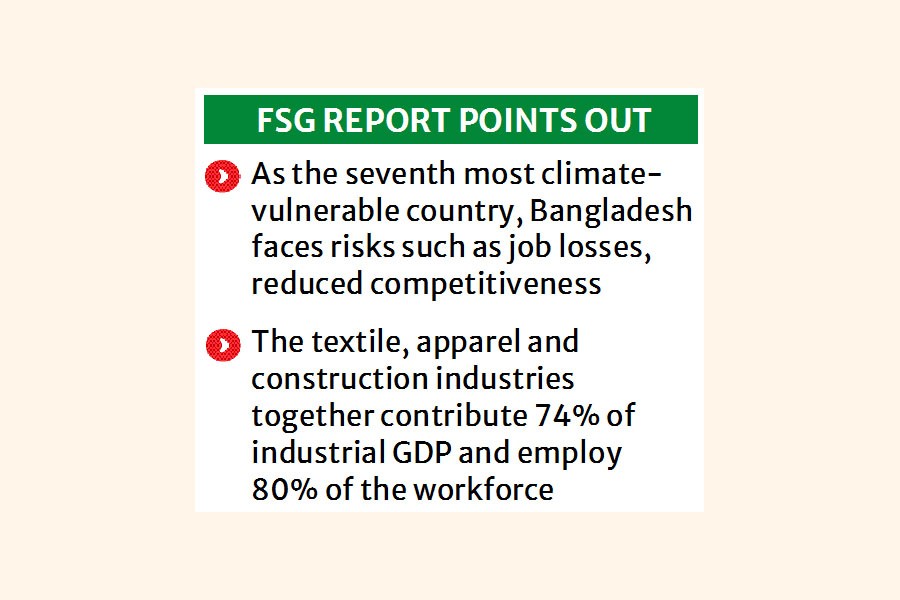Textile, apparel and construction sectors
Dhaka urged to set seven priorities for climate-resilient industries

Published :
Updated :

Bangladesh needs to pursue seven interlinked priorities simultaneously to accelerate its transition to more just, low-carbon and climate-resilient textile, apparel and construction industries, according to a latest report.
The report identified the pathway for Bangladesh to advance its development trajectory while reducing climate impacts by decarbonising industries as well as enhancing the resilience of workers and communities.
The interconnected priorities identified by the report by FSG-a mission-driven consulting firm commissioned by Laudes Foundation and H&M Foundation-included climate change mitigation through transition to low-carbon manufacturing, including design, processes and energy.
Utilisation of innovative processes that reduce onsite burning of fossil fuels and improvements in energy efficiency and material efficiency of existing processes can help reduce onsite burning of fossil fuels, which account for 83 per cent of textile and apparel sector emissions and 80 per cent of construction sector emissions.
Addressing the remaining emissions from these sectors, which are from consumption of electricity from the grid, requires a combination of decarbonisation of the grid and switching to onsite renewable.
"As the seventh most climate-vulnerable country, Bangladesh urgently needs to take adequate adaptation measures to mitigate risks of job losses, reduced competitiveness, and heightened vulnerability to climate shocks," said the report styled 'Just Climate Transitions in Bangladesh -- Accelerating Multistakeholder Action in Textile and Apparel and Construction Industries'.
Bangladesh is one of the fastest-growing economies globally, with industry at the heart of its growth employing 12-million people and accounting for 34 per cent of its GDP, according to the report published on January 28.
The textile and apparel, and construction sectors together contribute 74 per cent of the industrial GDP, 80 per cent of the workforce and are responsible for half of industrial emissions.
These vital sectors are therefore critical to industry transition in Bangladesh.
Drawing on inputs from over 100 Bangladeshi and international stakeholders, the report presented 10 scenarios -- multiple potential futures that explore the entire spectrum of possibilities, positive and negative within both sectors.
Two scenarios -- Green Forest (sustainable fashion with low unemployment and competitive markets) and Green City (low-carbon, climate-resilient construction) -- showcase the full potential of industry transitions to protect industry competitiveness and resilience, create quality jobs and fair outcomes for workers and their communities.
Other priorities included using sustainable inputs that can reduce emissions from upstream and downstream parts of the value chain and mitigate transition risk as global and domestic demand moves towards lower-carbon production and climate adaptation at site and manufacturing hub level.
Climate change-induced heat stress and high vulnerability to flooding are already impacting worker productivity and causing supply chain disruptions in the textile and apparel sector in Bangladesh, according to the report.
It suggested alternative sector development, skilling and social protection to mitigate job losses, saying: "As textile and apparel, and construction sectors transition, old roles will be phased out and new roles created."
Investment in existing sectors with growth potential like jute, healthcare, hospitality and retail may create about 1.5-million new jobs in Bangladesh by 2030, it says, adding that the jobs could be taken up by workers formerly employed in the textile and apparel and construction sectors, provided they receive skilling and placement support.
It highlighted availability of adequate and affordable housing to improve worker resilience to transition, saying affordable housing, with basic facilities can help improve workers' resilience to the impacts of climate change, protecting the competitiveness of the industries they are employed in.
Development of innovative financing solutions and prioritisation of inclusion and agency of and accountability to workers involved are other priorities.
"Philanthropy has the unique power to help us imagine 'what can be,' and this report offers a compelling blueprint for how to decarbonise leading Bangladesh sectors in a way that works for workers and communities," Laudes Foundation CEO Leslie Johnston said in a statement.
Just transition cannot advance in silos and will require increased complementary and concerted action between all stakeholder groups, both within Bangladesh and with supporting international partners.
While much is in place, there are still significant gaps to be filled and much wider uptake is needed to advance initiatives, according to Johnston.
Bangladesh stands at a crossroads with scope for real and lasting leadership that secures a bright future for the country, its industries and people, she adds.
munni_fe@yahoo.com


 For all latest news, follow The Financial Express Google News channel.
For all latest news, follow The Financial Express Google News channel.